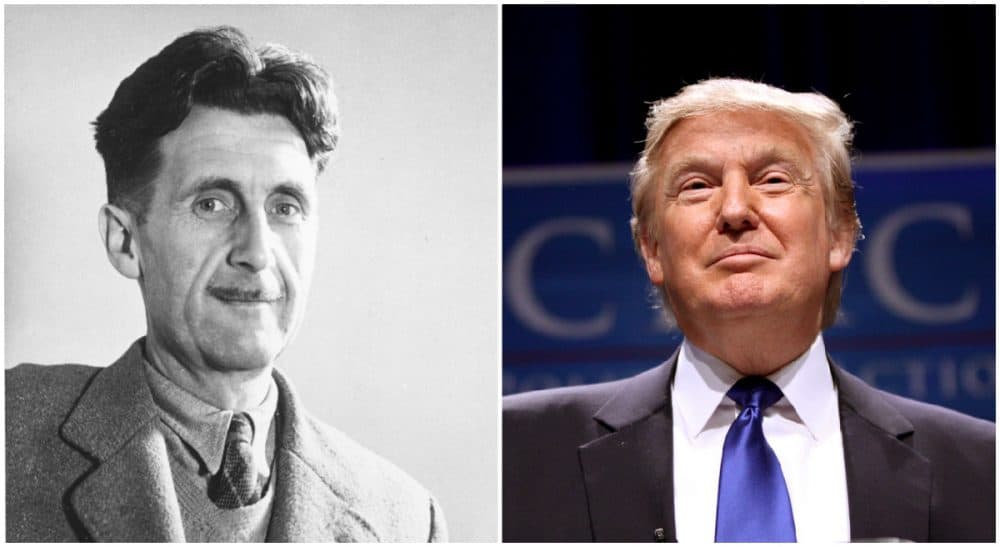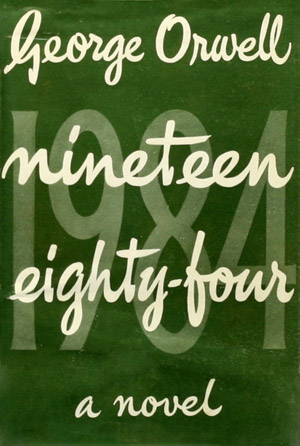Advertisement
What Republicans Can Learn From George Orwell — It’s Not What You Think

American Republicans love to cite George Orwell’s most famous novel, "1984," in support of their critiques of government overreach. In 2013, current presidential contender Ted Cruz used the novel to bash what he called the “Big Government crowd,” citing Orwell’s depiction of “an all-powerful central government that monitored the citizens at all times.” Orwell’s nightmarish science fiction, Cruz warned, was becoming reality on American soil.
Rand Paul, another presidential candidate, has a seven-minute YouTube video in which he argues that we have become “Orwellian without even knowing it,” thoughtlessly ceding our individual rights to the government. In the video, Paul claims to have read Orwell’s novel twice, once as a teenager and again in his 40s. The novel affected him so much the second time around, he says, that he cried at the fate of the novel’s two protagonists, who are ultimately reduced to human shells in the torture chambers of a repressive government.
One can almost envision the overall-clad denizens of Oceania marching through the streets with placards celebrating Big Brother’s ability to 'Make Oceania Great Again.'
Of course any reader who has dipped into Orwell’s work beyond "1984" and "Animal Farm" knows what a distorted picture of Orwell’s work this perspective represents. The two anti-communist novels represented a late turn in his work, and were never meant to stand in critique of the socialism that Orwell espoused for his entire life. He clarified this in response to a letter from an American reader after the publication of "1984," stating emphatically that “My recent novel is NOT intended as an attack on Socialism or on the British Labour Party (of which I am a supporter).”
To the contrary, Orwell wrote his two most famous novels to expose the workings of then-communist states that were, in his mind, giving a bad name to the socialist programs he supported. In an earlier, longer essay, “The Lion and the Unicorn: Socialism and the English Genius,” Orwell spelled out fully the program he believed would enable England to become a just and prosperous society. It included the nationalization of all major industries and an income policy which would prevent the salaries of executives from rising above 10 times the income of the lowest-paid workers.
Every Republican ever, one imagines, would disagree. But that doesn’t mean that Republicans don’t have much to learn from one of Britain’s great socialist thinkers. In fact it may be time for Republicans to have another look at Orwell’s most famous novel, which might help them understand more clearly the mystifying appeal of Donald Trump, their leading presidential candidate.

Republican political pundits have been stepping up their critiques of Trump lately. Late last year, Michael Reagan said that his father Ronald Reagan would be “appalled” by Trump. George Will argued more recently that a Trump victory could spell the end of the Republican Party in America. These harsh words against one of their own come tinged with a kind of bafflement at the phenomenon of Trump: How do we make sense of his popularity?
Orwell can help. Long before he envisioned the charismatic figure of Big Brother, Orwell argued that most people are not casting their votes for executives based on their political positions. The most successful leaders, he suggested, know how to manipulate the emotions of their followers: “The energy that actually shapes the world,” Orwell wrote, “springs from emotions—racial pride, leader-worship, religious belief, love of war.”
The phrases after that dash read like a four-point program for the political campaign of Donald Trump. With his diatribes against Mexicans and Muslims, his self-aggrandizing statements of his own greatness, his citation of the Bible as his favorite book and his bellicose language on our enemies, Trump has followed Orwell’s prescription to the letter. The only people who don’t respond to the approach taken by leaders like Trump, according to Orwell, are the “intellectuals.” George Will, take note.
In "1984," Big Brother’s rule depends entirely upon whipping up the people into emotional frenzies, and then directing their emotions in support of patriotic efforts: organizing rallies, building munitions, creating banners and posters. One can almost envision the overall-clad denizens of Oceania marching through the streets with placards celebrating Big Brother’s ability to “Make Oceania Great Again.”
If the Republican Party hopes to rid themselves of Donald Trump, they don’t need someone who can offer smarter policy prescriptions. They need to take a cue from George Orwell, and find someone else for their supporters to love.
But the true genius of Trump lies with his specific strategy for whipping up the emotions of his supporters, one depicted by Orwell as Big Brother’s most effective tactic: uniting his followers in hatred of a common enemy. The government of Big Brother accomplishes this goal in the form of the Two-Minute Hate, a daily ritual in which citizens are shown pictures of terrorists and traitors and enemy soldiers on public telescreens and encouraged to express their anger in fits of orgiastic rage. Every Two-Minute Hate concludes with heroic images of Big Brother, a strategy that productively channels the heightened emotions of his followers into blind love of their leader.
If this conjures images of a Donald Trump rally, in which Mexican and Muslim enemies seem as interchangeable as Eastasian and Eurasian soldiers in Orwell’s novel, you’re beginning to get the picture. Trump has recognized what Orwell described: Our most powerfully felt emotions are negative ones, and they demand action and resolution. Trump works the fear and anger of his followers like a virtuoso conductor, stirring up these emotions and then resolving them into support of his promise to vanquish foes near and far.
In the final scene of "1984," a broken Winston Smith gazes up at the televised image of Big Brother, and his heart swells with emotion: “Two gin-soaked tears trickled down the sides of his nose . . . He loved Big Brother.” If the Republican Party hopes to rid themselves of Donald Trump, they don’t need someone who can offer smarter policy prescriptions. They need to take a cue from George Orwell, and find someone else for their supporters to love.
James M. Lang is working on a book about George Orwell and Dorothy Day.
